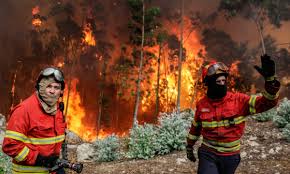Portugal wildfires: Why are Iberian forests so flammable?

Lisbon: The amount of land ravaged in Portugal’s recent devastating wildfires is estimated to cover 122,000 hectares. Around 83% of the land is located in the north and centre of the country.
Wildfires have been raging in central and northern Portugal since 15 September, claiming at least five lives and injuring 182 people.
An estimated 122,380 hectares worth of land has burned in the blazes, according to the Portuguese Nature Conservation and Forestry Institute (ICNF). About 60% of the land incinerated was forest stands, 29% of it scrub forest and 11% cropland.
Portugal is among the European countries hardest hit by wildfires in recent years.
Experts claim the recent disaster has been caused by a combination of strong winds, climate change bringing higher temperatures than usual for the late summer (exceeding 30ºC) and very low humidity.
They also warn that a lack of biodiversity in Portuguese forests and a rising depopulation of these areas are the biggest factors that contribute to extreme wildfires.
Deadly flooding and wildfires are signs of ‘climate breakdown’ fast becoming the norm, EU warns
“We’re heading towards a very worrying situation in terms of climate change, in which these very critical conditions that we’ve had are going to happen more and more,” Maria Conceição Caldeira, ForEco researcher and coordinator, said. “We really need to have a very adapted landscape.”
Former Portuguese Green MEP Francisco Guerreiro is among the most vocal politicians in calling out for more biodiversity in this country’s forests.
“What is missing in Portuguese forests is biodiversity and responsible long-term management,” he said. “We need more and better forests.”
Portugal’s wildfires produce record emissions with smoke headed for France and Spain
A need for a more diverse forest landscape
According to the ICNF, Portugal’s forest area is 26% eucalyptus trees, 23% cluster pine, 23% cork oak, and 11% holm oak. Researchers do not consider these four tree species varied enough to prevent the rapid spread of wildfires.
“There is no tree species that will stop wildfires happening,” Conceição Caldeira said. “There is also no tree species which will determine whether the fire will be more intense or not.”
Yet because some trees grow longer than others and may respond differently to fires, a combination of species along the landscape will help the country avoid intense wildfires.
With the effects of the deadly wildfires of June 2017 still being felt, forest management has again come under scrutiny.
Climate groups Climáximo and Emergência Florestal are organising demonstrations across Portugal on 22 September to protest against the apparent inaction in preventing forest fires.





